Education
D.C. parents protest Congress’ proposed $1B cut to city’s budget

WASHINGTON — School was out on Thursday, so D.C. parents decided it was time for a field trip to Capitol Hill.
There, they lobbied against Congress’ temporary government funding bill that could slash the city’s budget by more than $1 billion and leave public schools vulnerable to cuts.
Parents mobilized one another to call members of Congress, show up at senators’ offices and lobby Senate staffers who have children in D.C. public schools. They coordinated their actions through PTAs, group chats and email listservs, while also urging family members outside of the district to contact their members of Congress.
Follow live politics coverage here
One text in a group chat of D.C. parents noted that a Senate Republican staffer had children at their school, adding that there was a movement to corner her. Another parent told NBC News that parents have been working to figure out which Capitol Hill staffers with children in public schools could be reached.
Some parents have been leveraging relationships with people who may hold sway on the Hill.
“Parents have described staffers who they are either personal friends with or former colleagues that they have reached out to personally,” Emma Kelly, a D.C. public schools parent, said.
The city’s fiscal year 2025 budget was approved last year, increasing the budget by more than $1 billion. But the funding bill being considered by Congress would force the city to revert back to fiscal 2024 budget levels, reducing the city’s spending by $1.1 billion in six months, D.C. Mayor Muriel Bowser said this week.
Previous temporary government funding bills, known as continuing resolutions, have had provisions allowing D.C. to continue spending funds in line with the city’s current fiscal year budget, rather than the previous one. Such a provision was excluded from this week’s bill.
As parents protested at her colleagues’ offices, Sen. Susan Collins, R-Maine, told reporters that she would speak with Bowser on Thursday.
“I do not support this restriction on the District of Columbia’s ability to use its own funding,” said Collins, who chairs the Senate Appropriations Committee. She added, however, that she still plans to vote for the bill.
Parents have been focusing on outreach to Republicans and moderate Democrats, emphasizing to members of Congress that their staffers are often D.C. residents whose kids may attend the city’s public schools.
Multiple parents told NBC News that their lobbying of other parents took place privately through text messages and interactions in schools and neighborhoods, nervous that their employers would look negatively on activism during a new presidential administration.
One woman who has a child in D.C. public schools told NBC News that she had spoken with Sen. Lisa Murkowski, R-Alaska, on Wednesday about the bill’s impact on D.C.’s budget. Murkowski seemed receptive and said that her staffers remind her frequently that they are all D.C. residents, the woman said.
D.C. does not have voting members of Congress, so parents and children roamed the floors of the Hart Senate office building on Thursday, urging Senate staffers to protect the city’s funding.
“It was important for me to go to Senate Hart, largely because I’ve been watching the educators around me continue to give their all to raising future generations,” said 16-year-old Erica Floyd, who attends a D.C. public high school and visited a Senate office building to try to talk to senators. “Their perseverance, dedication and support for students and their education inspired me to do my part and advocate for my peers’ education and my own.”
Sixth graders Leo Benevelli, Jake Kaplan and Jake Zelin visited Sen. Jon Ossoff’s office with their moms after he said he was assessing the bill. Ossoff, a Democrat from Georgia, is up for re-election in 2026.
“I really don’t think this is what the Founding Fathers of our country would have wanted, and our country is built by teachers and schools,” Benevelli said.
Several of the advocates who visited Capitol Hill on Thursday invoked their upbringing as they brought their cases to Senate staffers.
Douglas McRae was born and raised in Mississippi and now lives in D.C. with his 4-year-old son, Luca, who is in the city’s pre-K program. The two visited Sen. Cindy Hyde-Smith’s office on Thursday with other advocates, urging the staff for the Mississippi Republican to ensure that the city’s budget remained in tact.
McRae has asked his parents and Luca’s aunt and uncles in Mississippi to contact their members of Congress.
“I’ve told them to reach out and call as well to make sure that people in Mississippi are not OK with this,” he said.
It’s a tactic used by other D.C. families, too, who worry that their voices won’t be heard without a voting member of Congress. The city has a delegate and two shadow senators, but they cannot vote on legislation.
“I’ve asked my family and my friends who live in states with voting senators to please advocate on our behalf,” said Caitlin Rogger, whose 8- and 10-year-old children are in D.C. elementary schools. “The Senate can turn this around, but D.C. doesn’t have a senator who can vote, so there’s no one beholden to my neighbors and me for this decision.”
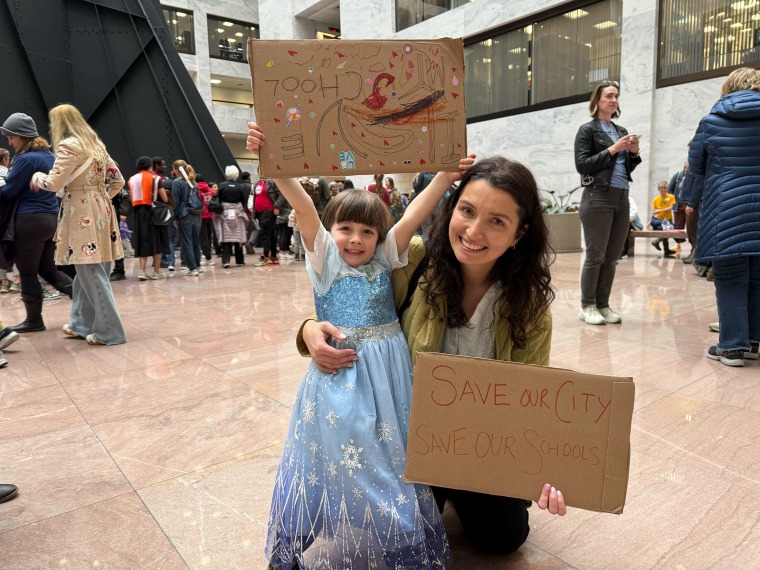
Ashley Smith Thomson visited senators’ offices Thursday, one day after her latest chemotherapy treatment for breast cancer. She is on medical leave, which is putting a strain on her finances and has her worried about what potential spending cuts could mean for child care in D.C.
“If it goes away, I don’t know what I’m going to do with my daughter while I’m recovering from a double mastectomy,” said Smith Thomson, whose child is in first grade.
It’s unclear exactly what programs would face funding cuts if the bill goes through, but the mayor has laid out that some of the top areas that the city spends money on are public education, public safety and Health and Human Services.
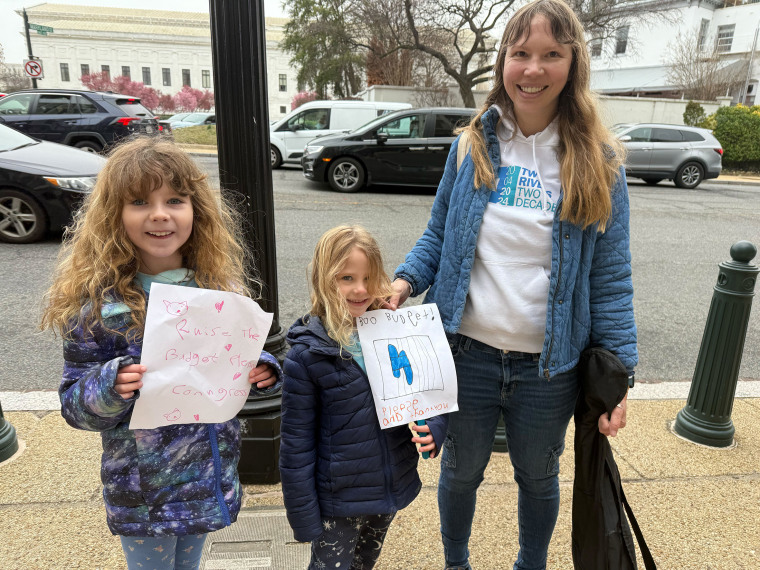
Megan Lebowitz / NBC News
“There’s no way to cut that kind of money in the time that we would have in this fiscal year not to affect police or not to affect teachers and not to affect some of the basic government services that allow us to keep our city clean, safe and beautiful,” Bowser told reporters Monday.
When reached for comment, a spokesperson for the mayor said that her office is “hopeful that our partners in Congress will get it fixed this week.”
A spokesperson for Rep. Tom Cole, R-Okla., who chairs the Appropriations Committee and introduced the bill this month, did not respond to a request for comment about the bill’s impact on D.C.’s funding.
The House voted on Tuesday to pass a six-month funding bill that mostly maintains similar funding levels from 2024. The Senate has not yet voted on the bill, but Democrats have said they will reject it. The government faces a Friday night deadline to avoid a shutdown.
Education
In his war on Harvard, Trump pits the Ivy League against the working class

As President Donald Trump’s war on Harvard University intensifies, he is shifting his message in a seeming bid for new allies — apart from punishing the institution, he’s also promising to elevate the working class.
In a post on Truth Social on Monday, Trump proposed sending $3 billion in research funding cut from Harvard to trade schools across the country. “What a great investment that would be for the USA, and so badly needed!!!” he wrote.
With that money, he told reporters at the White House on Wednesday, “you can have the best trade schools anywhere in the world.”
It’s unclear how Trump’s proposal would work, where the money would come from or how it would be distributed. The Trump administration didn’t respond to questions.
But while the plan may be untenable, some education experts say pitting research at the world’s wealthiest university against support for low-cost trade schools is a savvy move.
“Politically it’s incredibly effective,” said Nat Malkus, deputy director of education policy at the American Enterprise Institute, a right-leaning think tank. “He communicates in a very brief post on Truth Social where his favor lies, and it lies not with the, you know, elite cosmopolitans at Harvard but with everyday Americans.”
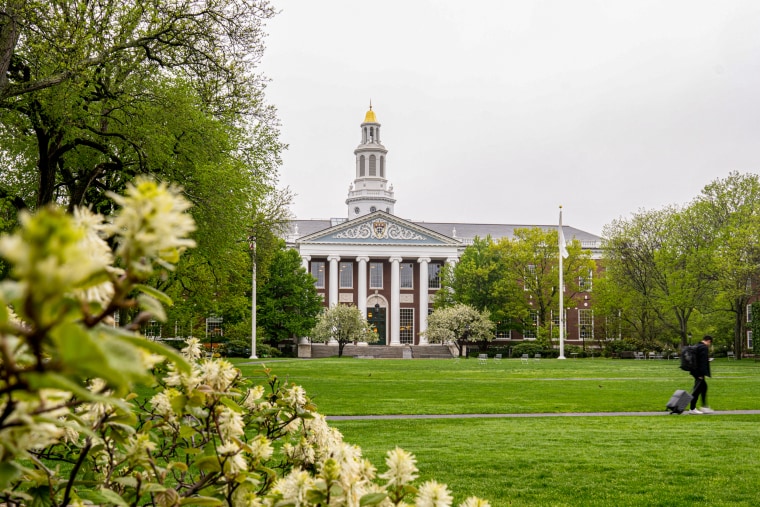
Trump has blasted elite colleges for years as out-of-touch institutions that don’t do enough to help students avoid debt, often singling out Harvard, even before the current conflict. More recently, the Trump administration has accused Harvard of failing to address antisemitism and issued a mandate for sweeping reforms in whom the university can admit and hire.
When Harvard refused the demands, the administration cut nearly $3 billion in research funding and attempted to end its ability to host international students.
This week’s push represents a new tactic: trying to build public support by implying that Harvard’s success comes at a cost to working Americans.
Most of the federal government’s cuts to Harvard have been to health research, such as studies on cancer and lung disease, which the university has defended as vital. Harvard didn’t respond to a request for comment. In an NPR interview, Harvard President Alan Garber challenged Trump’s approach.
“The real question is how much value does the federal government get from its expenditures on research,” he said. “There is a lot of actual research demonstrating the returns to the American people have been enormous.”
The Trump administration defended the cuts. “American universities that are committed to their academic mission, protect students on campus, and follow all federal laws will have no problem accessing generous taxpayer support for their programs,” Madi Biedermann, a spokesperson for the Education Department, said in a statement.
Improving vocational education has been a priority in both Democratic and Republican administrations. Trump has spoken about it in tandem with his quest to bring manufacturing jobs back to the United States. Last month, he signed an executive order directing federal agencies to coordinate a national strategy on career and technical education.
At her confirmation hearing, Education Secretary Linda McMahon emphasized the value of such schools. “Our vocational and skilled-based training is not a default education; it can be front and center so that students who are inclined to go in that direction actually should be encouraged to do that,” she said.
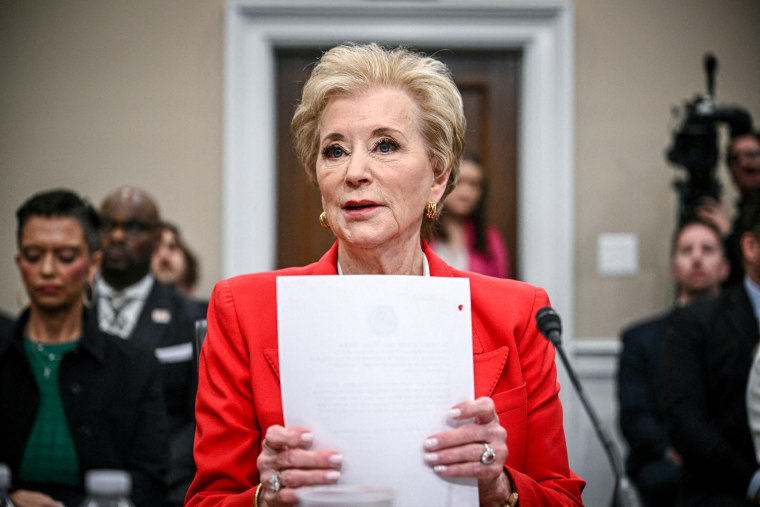
Jerome Grant, CEO of Universal Technical Institute Inc., one of the largest private chains of trade schools, said he has had meetings with Education Department officials about increasing support for vocational education, but not at the expense of other colleges. His concern is less about money, he said, than about helping teens and young adults see the benefits of trade school.
“We’re not in the fray with Harvard or anything — we don’t have any beef with any four-year schools,” Grant said. “We just believe that for a lot of kids in America, four-year schools shouldn’t be thought of as their only path after high school.”
The idea that all students should strive for degrees from traditional four-year colleges has given way in recent years amid economic changes and mounting student debt, creating an ascendant bipartisan agreement that other education options should be supported, too.
Trade schools focus on preparing students for certification in specific professions without the general education courses or electives of traditional colleges. So they typically take less time to complete and are less expensive than four-year colleges. Some trade schools are housed at community colleges, largely funded by states and federal student aid.
But many trade schools are also considered for-profit colleges, a sector of higher education that has been scrutinized in the past for failing to deliver on its promises to students.
Education policy experts say the “One Big Beautiful Bill” that Trump urged House Republicans to pass could weaken regulations of the schools — and harm working students. As currently drafted, it would roll back regulations that hold career-training programs accountable if their students don’t earn enough after they graduate and expand Pell Grant use to students at shorter-term and unaccredited education programs. It would also limit Pell Grant eligibility for part-time students, many of whom are working-class.
Neither the White House nor the Education Department responded to questions about the provisions.
Jason Altmire, president of Career Education Colleges and Universities, an association that represents private trade schools and for-profit colleges, said his organization welcomes the reforms in the House bill and Trump’s suggestion of pumping more money into trade schools.
Altmire, a former Democratic House member from Pennsylvania, called the Truth Social post a “continuation of a lot of good things President Trump has done and said” about the schools he represents. (A former chief policy officer at Altmire’s group has been tapped to become the country’s top higher education official.)
He said that his sector of for-profit schools — whether they are vocational or degree-awarding — has been unfairly maligned based on a few extreme examples and that they represent a way forward for many people.
“I don’t view it as a zero sum, but I do view it as a changing of the narrative of what’s the priority of this country when it comes to higher education,” he said.
Carolyn Fast, director of higher education policy at the Century Foundation, a progressive think tank, also supports vocational education and questions the need to pit it against schools like Harvard.
“It’s a false narrative to say the fact that we’re funding research at these colleges means we’re not funding opportunities for people to have good career education,” she said. “Both are good goals for us to have.”
Education
U.S. will ‘aggressively’ revoke Chinese students’ visas, Rubio says
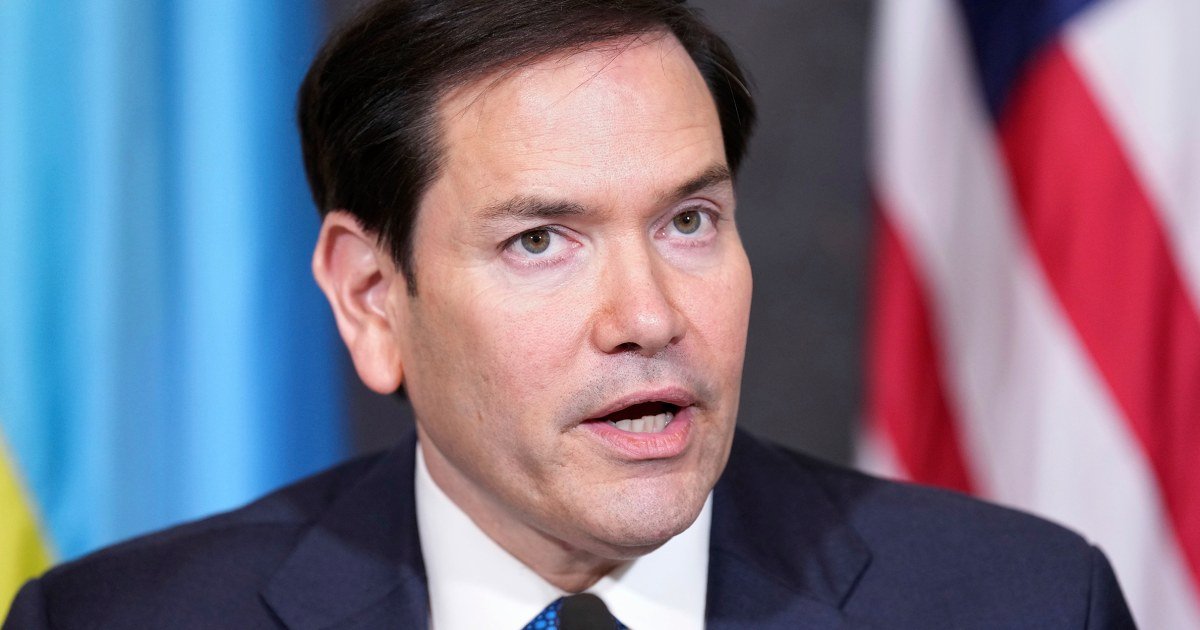
HONG KONG — The United States will start “aggressively” revoking the visas of Chinese students, Secretary of State Marco Rubio said Wednesday, including those with connections to the Chinese Communist Party or studying in critical fields.
The announcement is the latest move in the Trump administration’s campaign against U.S. universities and international students in particular, after it revoked thousands of students’ visas, detained or deported others over political activism, and sought to bar international students from enrolling at Harvard.
Rubio said in a statement that visa criteria would also be revised to “enhance scrutiny” of all future visa applications from the People’s Republic of China and the Chinese territory of Hong Kong.
“Under President Trump’s leadership, the U.S. State Department will work with the Department of Homeland Security to aggressively revoke visas for Chinese students,” he said.
The Chinese Embassy in Washington did not immediately respond to an emailed request for comment outside of business hours. Beijing has previously expressed opposition to the “politicization” of educational exchanges and said it would “safeguard the legitimate rights and interests” of Chinese students overseas.
China is the second-biggest source of international students in the U.S. after India, though numbers have been dropping in recent years amid growing U.S.-China tensions and disruptions from the Covid-19 pandemic. In the 2023-24 academic year there were about 277,000 Chinese students in the U.S., down from a peak of more than 370,000 in 2019-20.
International students make up about 6% of the total population of U.S. higher education overall.
NBC News reported Tuesday that the Trump administration had stopped scheduling new interviews for foreign nationals seeking visas to study in the U.S., citing an internal State Department cable. The cable said the suspension was in preparation for expanded social media screening of applicants.
Education
Two UW-Platteville students die in ‘targeted and isolated’ shooting at dorm

Two University of Wisconsin-Platteville students died in what officials said Monday was a “targeted and isolated” shooting on campus.
The two 22-year-old students, Kelsie Martin and Hallie Helms, were the only people involved in the incident at an on-campus residence hall, the university said.
Martin, a psychology major and assistant resident director at Wilgus Hall, was airlifted to a University of Wisconsin hospital after she was found with a gunshot wound, according to the statement.
She was later pronounced dead, the school said.
A preliminary autopsy found that Helms, who lived at Wilgus Hall and was an elementary education major, died from a self-inflicted gunshot wound, the school said in a statement Tuesday night.
Helms was pronounced dead at the scene, according to the statement.
The statement did not provide additional details about the nature of the shooting and asked for people with information to share it with the school’s police department.
Earlier, UW-Platteville Police Chief Joe Hallman said that authorities quickly determined there was no ongoing threat after receiving a 911 call about an incident at Wilgus Hall shortly before 4 p.m. A shelter-in-place order was lifted just after 5 p.m.
Sophomore Eric Sperduto, who lives in Wilgus Hall, told NBC affiliate WMTV of Madison that he saw two girls running from the building after 4 p.m. Monday. He also saw law enforcement in the building.
“It’s just really sad and just sad to think about the families that are affected by this and people that were their friends and stuff that, I guess, that are students just like me that are changed now,” Sperduto told the station.
In a statement, Chancellor Tammy Evetovich mourned the loss of Martin, of Beloit, Wisconsin, and Helms, of Baraboo, Wisconsin, and said the well-being of their community was top of mind.
“Please take the time to take care of yourself and others,” she said.
The university, which has a student body of more than 6,000, canceled final exams and is offering counseling services this week for members of the community, according to the statement.
If you or someone you know is in crisis, call or text 988, or go to 988lifeline.org, to reach the Suicide & Crisis Lifeline. You can also call the network, previously known as the National Suicide Prevention Lifeline, at 800-273-8255, or visit SpeakingOfSuicide.com/resources.
-

 Africa4 days ago
Africa4 days agoSurvivor of Liverpool car ramming talks of shock and panic
-

 Lifestyle3 days ago
Lifestyle3 days agoChildren and careers: Talking to kids about what they want to be when they grow up
-

 Lifestyle4 days ago
Lifestyle4 days agoHow to decorate a patio, balcony or other small outdoor space
-

 Sports3 days ago
Sports3 days agoThe Knicks are bringing hope and title dreams back to New York after years in the doldrums
-

 Asia5 days ago
Asia5 days agoHuge blast rocks Chinese chemical plant, authorities launch rescue operation
-

 Lifestyle3 days ago
Lifestyle3 days agoFaizan Zaki hopes to go from spelling bee runner-up to champ
-

 Middle East4 days ago
Middle East4 days agoSudan says cholera outbreak killed 172 people in a week | Health News
-

 Asia3 days ago
Asia3 days agoAnalysis: China thought it had a truce with the US. Then Trump dropped two bombshells




